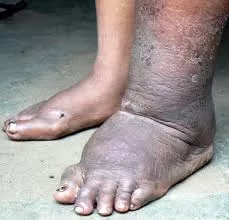The Gujarat government is set to launch the second phase of its Mass Drug Administration (MDA) programme from February 10 to 12, aiming to eradicate filariasis (elephantiasis) by targeting over 5.46 lakh citizens across four talukas. This initiative underscores the state’s commitment to public health, an official announced on Saturday.
To ensure effective drug distribution, health workers, including ASHA and Anganwadi staff, along with school teachers, have received specialized training. On February 10, approximately 610 teams will administer the medication at 776 Anganwadi centers, 748 schools, and 13 colleges.
Given that filarial parasites circulate in the bloodstream primarily at night, health authorities will collect blood samples between 8 p.m. and midnight for accurate detection. This strategy is crucial for identifying and treating infected individuals effectively.
Gujarat’s Commitment to Disease Eradication
Gujarat has a history of successfully eliminating diseases like tuberculosis and polio. With this latest initiative, the state aims to eradicate filariasis, reinforcing its vision of “Healthy Citizens, Healthy Nation.”
Lymphatic filariasis, commonly referred to as elephantiasis, continues to be a public health concern in Gujarat. In 2015, the state reported a microfilaria (MF) rate of 0.44 per cent, highlighting the disease’s prevalence. Despite consistent efforts, cases persist. In 2023, after a three-year gap, four cases were detected in Ahmedabad’s Ramol area, all involving migrant laborers from Uttar Pradesh.
Historically, Gujarat has been among the states with reported cases of filariasis. To combat the disease, the state has conducted multiple MDA programmes. For instance, Tapi district carried out an MDA drive in January 2020. Surveys in 2016 showed a significant decline in MF prevalence, dropping from 0.33 per cent in 2008 to 0.06 per cent in 2016, demonstrating the effectiveness of these interventions.
Challenges in Urban Areas
Despite these efforts, urban areas with high migration rates, such as Surat, pose challenges to disease eradication. The movement of people from endemic regions increases the risk of transmission, making continuous monitoring and targeted interventions crucial.
Gujarat’s health authorities remain committed to eliminating lymphatic filariasis through sustained efforts, strategic planning, and community engagement.
Disclaimer: This article is based on official reports and government announcements. Readers are advised to follow updates from health authorities and seek medical advice if needed.











